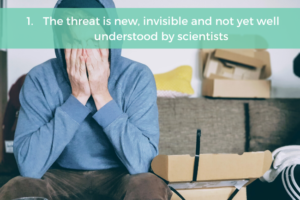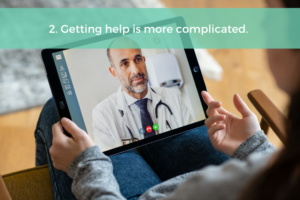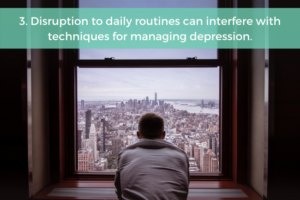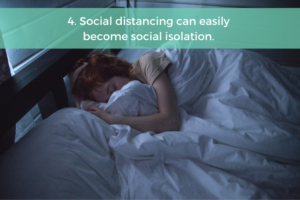This content is sponsored by Greenbrook TMS.
While stress, anxiety, and restlessness are widely accepted as common reactions to sheltering in place during the COVID-19 pandemic, those who struggle with depression— one out of every six American adults— may find this time particularly challenging. What’s worse is a third of these people have treatment-resistant depression, meaning at least two medications have failed to give them relief from their symptoms. Depression is a medical illness associated with changes in brain activity, distorting the thoughts and emotions of people afflicted with the disease. The COVID-19 pandemic can tax anyone’s resiliency, but people with depression are at risk of being stretched beyond their limits. Here are five aspects of the COVID-19 pandemic that can worsen depression, and what you can do if you need help.
 The threat is new, invisible and not yet well understood by scientists. People with depression can often have tendencies towards catastrophic thinking and worry that resonates with the uncertain narrative of this pandemic, resulting in a feedback loop that can worsen their underlying symptoms. Things that were once simple can be burdensome and anxiety provoking. For example, a trip to the pharmacy can now produce an internal dialogue of the risks and benefits of trying to get a refill on a prescription, knowing it will require stepping into a community location.
The threat is new, invisible and not yet well understood by scientists. People with depression can often have tendencies towards catastrophic thinking and worry that resonates with the uncertain narrative of this pandemic, resulting in a feedback loop that can worsen their underlying symptoms. Things that were once simple can be burdensome and anxiety provoking. For example, a trip to the pharmacy can now produce an internal dialogue of the risks and benefits of trying to get a refill on a prescription, knowing it will require stepping into a community location. Getting help is more complicated. Most of us are accustomed to face-to-face appointments with a prescribing provider or a therapist. But in these times, the once straightforward act of scheduling time with your clinician may now require more legwork, more logistics, and more variables. For patients dealing with depression, these changes can feel overwhelming and discouraging. (Despite this, we encourage all patients engaged in mental health care to continue to do so, which is in keeping with CDC recommendations.)
Getting help is more complicated. Most of us are accustomed to face-to-face appointments with a prescribing provider or a therapist. But in these times, the once straightforward act of scheduling time with your clinician may now require more legwork, more logistics, and more variables. For patients dealing with depression, these changes can feel overwhelming and discouraging. (Despite this, we encourage all patients engaged in mental health care to continue to do so, which is in keeping with CDC recommendations.) Disruption to daily routines can interfere with techniques for managing depression. Losing your routine can create barriers to coping strategies, making managing your mental health during this crisis even more challenging. For example, limited exposure to fresh air and sunshine due to shelter-in-place policies can interfere with sleep circadian rhythms leading to sleep disruption, which impacts central nervous system health. Diet choices may be more limited, causing malnutrition or unhealthy dietary habits. The COVID-19 pandemic can add a burden to activities that had been relatively simple to perform, making daily life more complex and seemingly a greater chore.
Disruption to daily routines can interfere with techniques for managing depression. Losing your routine can create barriers to coping strategies, making managing your mental health during this crisis even more challenging. For example, limited exposure to fresh air and sunshine due to shelter-in-place policies can interfere with sleep circadian rhythms leading to sleep disruption, which impacts central nervous system health. Diet choices may be more limited, causing malnutrition or unhealthy dietary habits. The COVID-19 pandemic can add a burden to activities that had been relatively simple to perform, making daily life more complex and seemingly a greater chore. Social distancing can easily become social isolation. Involuntary social isolation from social distancing and shelter-in-place policies can remove the positive buffering effect that comes with visiting friends and family. Isolation can cause boredom and can increase maladaptive habits, from sitting on the couch all day to excessive alcohol use and illicit drug use. This can exacerbate underlying diseases including mental health concerns.
Social distancing can easily become social isolation. Involuntary social isolation from social distancing and shelter-in-place policies can remove the positive buffering effect that comes with visiting friends and family. Isolation can cause boredom and can increase maladaptive habits, from sitting on the couch all day to excessive alcohol use and illicit drug use. This can exacerbate underlying diseases including mental health concerns. Uncertainties with financial and job stability are an especially heavy burden. For many, a sense of identity, pride, and security are all benefits of employment. With more than 22 million Americans suddenly unemployed and other workers afraid of losing their job, the threat to their livelihood is real. For people with treatment-resistant depression, this situation can heighten their anxiety, occupy mental bandwidth, and instill a sense of hopelessness.
Uncertainties with financial and job stability are an especially heavy burden. For many, a sense of identity, pride, and security are all benefits of employment. With more than 22 million Americans suddenly unemployed and other workers afraid of losing their job, the threat to their livelihood is real. For people with treatment-resistant depression, this situation can heighten their anxiety, occupy mental bandwidth, and instill a sense of hopelessness.
Thankfully, we at Greenbrook TMS want you to know that the situation is not hopeless. Transcranial magnetic stimulation, or TMS therapy, is a safe, FDA cleared, non-drug, non-invasive treatment for depression. We offer TMS therapy in an outpatient environment, away from hospitals and emergency rooms that are on the front lines of caring for patients with COVID-19. We accept most insurance plans, including Medicare and, in many states, Medicaid.
All Greenbrook TMS NeuroHealth centers are open and operational to assist you with any symptoms that persist despite treatment with medications and/or therapy. Call us today for a free consultation to see if TMS therapy can help you. If you need immediate help, please refer to our list of emergency resources.







